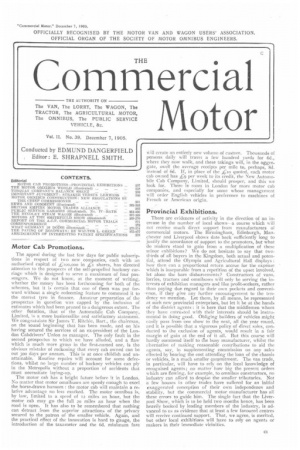Motor Cab Promotions.
Page 1

If you've noticed an error in this article please click here to report it so we can fix it.
The appeal during the last few days for public subscriptions in respect of two new companies, each with an authorised capital of',,Ioo,000 in Li shares, has directed attention to the prospects of the self-propelled hackney carriage which is designed to serve a iiniximum of four passengers. We do not know, at the moment of writing, whether the money has been forthcoming for both of the schemes, but it is certain that one of them was put forward without a single redeeming feature to commend it to the merest tyro in finance. Amateur preparation of the prospectus in question was capped by the inclusion of estimates which had been pruned to a dangerous extent. The other flotation, that of the Automobile Cab Company, Limited, is a more businesslike and satisfactory statement. We congratulate Sir James 'I'. Ritchie, Bart., the chairman, on the sound beginning that has been made, and on his having secured the services of an ex-president of the London Cabdrivers' Union as manager. The only fault in the second prospectus to which we have alluded, and a flaw which is much more gross in the first-named one, is the obvious mistake of reckoning that every cab owned can be out 300 days per annum. This is at once childish and unattainable. Routine repairs will account for some defections, whilst no large number of hackney vehicles can ply in the Metropolis without a proportion of accidents that must necessitate laying-up.
The motor cab has a bright future before it in London. No matter that motor omnibuses are speedy enough to excel the horse-drawn hansom : the motor cab will maintain a relative advantage no less marked. The motor omnibus is, by law, limited to a speed of 12 miles an hour, hut the motor cab may go the full 20 miles an hour when the road is open. It has also to be remembered that nothing can detract from the superior attractions of the privacy secured to the patron of the smaller vehicle. Again, and the practical effect of the innovation is hard to gauge, the introduction of the taxameter and the dd. minimum fare will create an entirely new volume of custom. Thousands of persons daily will travel a few hundred yards for 6d., where they now walk, and these takings will, in the aggregate, swell the average receipts per mile to, perhaps, 8d. instead of 6d. If in place of the Zio quoted, each motor cab owned has £9 per week to its credit, the New Automobile Cab Company, Limited, should prosper, and this we look for. There is room in London for more motor cab companies, and especially for some whose management will order English vehicles in preference to machines of French or American origin.
Provincial Exhibitions.
There are evidences of activity in the direction of an increase in the number of local shows--a course which will not receive much direct support from manufacturers of commercial motors. The Birmingham, Edinburgh, Manchester and Liverpool shows date back sufficiently long to justify the accordance of support to the promoters, but what do makers stand to gain front a multiplication of these minor exhibitions? We do not hesitate to say that twothirds of all buyers in the Kingdom, both actual and potential, attend the Olympia and Agricultural Hall displays : how then can a proportional return accrue for the expense which is inseparable from a repetition of the upset involved, let alone the bare disbursements? Constructors of vans, lorries, tractors and omnibuses will only be serving the interests of exhibition managers and like profit-seekers, rather than paying due regard to their own pockets and convenience, if they give any further encouragement to the tendency we mention. Let them, by all means, be represented at such new provincial enterprises, but let it be at the hands of the district agents : it is here that the middlemen whom they have entrusted with their interests should be instrumental in doing good. Obliging builders of vehicles might easily pas from one show to the next, all the year round, and it is possible that a vigorous policy of direct sales, conducted to the exclusion of agents, would result in a fair margin of gain at the end of it all. But this course will hardly commend itself to the busy manufacturer, whilst the alternative of making reasonable contributions to aid the agents, say, in supplementing commission on any sales effected by bearing the cost attending the loan of the chassis or vehicles, is a much smaller commitment. The van trade, in particular, will have to rely on the local knowledge of recognised agents; no matter how big the present orders which are flowing, for example, to omnibus constructors, no industry can afford to despise the smaller tributaries. Not a few houses in other trades have suffered for an initial exaggerated conceptikm of their own independence and stability, hut the commercial motor manufacturer has all these errors to guide him. The single fact that the Liverpool Show, which is to be held two months hence, has been heavily booked by leading members of the industry, is advanced to us as evidence that at least a few favoured centres will receive continued support. That, we agree, is merited, but other local exhibitions will have to rely on agents or makers in their immediate vicinities.






















